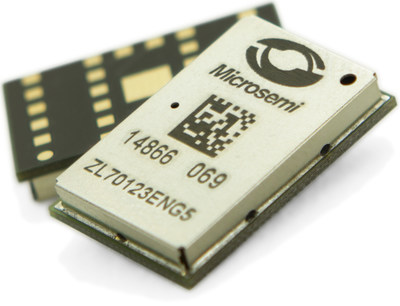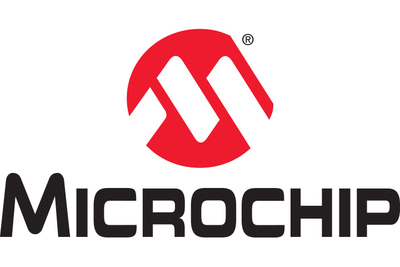Microsemi's New RF Modules Speed Time to Market for Implantable Medical Device Designers
Next-Generation Off-the-Shelf "Med-Net" Radio Link Streamlines Product Design Efforts
ALISO VIEJO, Calif., Feb. 22, 2018 /PRNewswire/ -- Microsemi Corporation (Nasdaq: MSCC), a leading provider of semiconductor solutions differentiated by power, security, reliability and performance, today announced the ZL70123, a new radio frequency (RF) base station module for implantable devices utilizing the Medical Implant Communication Service (MICS) RF band. The new module was developed specifically for external controllers and monitors of implantable medical devices.
Microsemi's ZL70123 base station module, when combined with the company's existing ZL70323 implant module, provides a complete solution for achieving the highest performance in next-generation medical networks (Med-Net). Both modules are based on the latest generation of Microsemi's ultralow power (ULP), MICS-band, radio transceiver chip, which has been deployed in more than three million implantable devices over the last 10 years.
Radio frequency technology is increasingly being used in a wide variety of medical implantable applications, including cardiac care, physiological monitoring (e.g., insulin monitoring), pain management and obesity treatments. According to a recent report from P&S Research, the market for active implantable devices, which includes pacemakers, defibrillators and neurostimulators, is expected to grow at an eight percent compound annual growth rate (CAGR) over the next five years, reaching nearly $29 billion by 2023. Microsemi's new ZL70123 base station module is ideally suited for the unique needs of this growing market.
"RF engineering is a highly specialized discipline, and leveraging Microsemi's deep expertise in this area allows our customers to reduce design times and minimize project risk," said Martin McHugh, Microsemi's product line manager for implant modules. "With Microsemi's two-module radio link, companies can now focus research dollars and development efforts on new therapies that enable a better quality of life."
About Microsemi's Med-Net Radio Link Solution
Microsemi's Med-Net radio operates in the 402 MHz to 405 MHz MICS band. Multiple ULP wake-up options are supported, including a 2.45-GHz, industrial, scientific and medical (ISM) band, wake-up option.
The existing Microsemi ZL70323 implant module implements all RF-related functions needed to deploy an implant node in a MICS-band RF telemetry system. It consumes less than six milliamps (mA) when transmitting or receiving data and consumes just 10 nanoamperes (nA) when in its sleep state. The integrated antenna tuning circuit allows the module to be used with a wide range of implant antennas (as nominal antenna impedance is 100+j150 ohms). The module includes the following major blocks:
- ZL70103-based MICS-band RF transceiver with integrated matching network, SAW filters for suppression of unwanted blockers and antenna tuning;
- 2.45-GHz wake-up receiver matching network;
- Integrated 24 MHz reference frequency crystal; and
- Decoupling capacitors.
The new Microsemi ZL70123 base station module includes all RF-related functions required to deploy external device functions in a MICS-band RF telemetry system. It is designed to meet regulatory requirements including Federal Communications Commission (FCC), European Telecommunications Standards Institute (ETSI) and International Electrotechnical Commission (IEC) standards. Additional features include:
- Integrated matching network with a nominal 50 ohm RF port;
- Bandpass filter for suppression of unwanted blockers;
- 2.45 GHz wake-up transmitter with a nominal 50 ohm RF port; and
- Fully shielded, 18 mm × 12 mm × 3 mm package.
"The ZL70123 base station module raises the bar in implant telemetry by offering more flexibility, longer range capability and smaller size than its predecessor while maintaining backward compatibility with older systems," said Jeff Kuhn, application manager for Microsemi. "Combining the ZL70123 base station module with the ZL70323 implant module, Microsemi's Med-Net radio solution enables deeper implants with strong communication links while preserving battery power."
Availability
Microsemi's new ZL70123 RF base station module is in production and available now. The company also offers an application development kit (ADK) to qualified customers (part number ZLE70103BADA). To learn more, contact [email protected] or visit https://www.microsemi.com/existing-parts/parts/137899.
About Microsemi
Microsemi Corporation (Nasdaq: MSCC) offers a comprehensive portfolio of semiconductor and system solutions for aerospace & defense, communications, data center and industrial markets. Products include high-performance and radiation-hardened analog mixed-signal integrated circuits, FPGAs, SoCs and ASICs; power management products; timing and synchronization devices and precise time solutions, setting the world's standard for time; voice processing devices; RF solutions; discrete components; enterprise storage and communication solutions, security technologies and scalable anti-tamper products; Ethernet solutions; Power-over-Ethernet ICs and midspans; as well as custom design capabilities and services. Microsemi is headquartered in Aliso Viejo, California and has approximately 4,800 employees globally. Learn more at www.microsemi.com.
Microsemi and the Microsemi logo are registered trademarks or service marks of Microsemi Corporation and/or its affiliates. Third-party trademarks and service marks mentioned herein are the property of their respective owners.
"Safe Harbor" Statement under the Private Securities Litigation Reform Act of 1995: Any statements set forth in this news release that are not entirely historical and factual in nature, including statements related to its new ZL70123, a new RF base station module for implantable devices utilizing the MICS RF band, and its potential effects on future business, are forward-looking statements. These forward-looking statements are based on our current expectations and are inherently subject to risks and uncertainties that could cause actual results to differ materially from those expressed in the forward-looking statements. The potential risks and uncertainties include, but are not limited to, such factors as rapidly changing technology and product obsolescence, potential cost increases, variations in customer order preferences, weakness or competitive pricing environment of the marketplace, uncertain demand for and acceptance of the company's products, adverse circumstances in any of our end markets, results of in-process or planned development or marketing and promotional campaigns, difficulties foreseeing future demand, potential non-realization of expected orders or non-realization of backlog, product returns, product liability, and other potential unexpected business and economic conditions or adverse changes in current or expected industry conditions, difficulties and costs of protecting patents and other proprietary rights, inventory obsolescence and difficulties regarding customer qualification of products. In addition to these factors and any other factors mentioned elsewhere in this news release, the reader should refer as well to the factors, uncertainties or risks identified in the company's most recent Form 10-K and all subsequent Form 10-Q reports filed by Microsemi with the SEC. Additional risk factors may be identified from time to time in Microsemi's future filings. The forward-looking statements included in this release speak only as of the date hereof, and Microsemi does not undertake any obligation to update these forward-looking statements to reflect subsequent events or circumstances.
SOURCE Microsemi Corporation
Related Links
WANT YOUR COMPANY'S NEWS FEATURED ON PRNEWSWIRE.COM?
Newsrooms &
Influencers
Digital Media
Outlets
Journalists
Opted In


Share this article